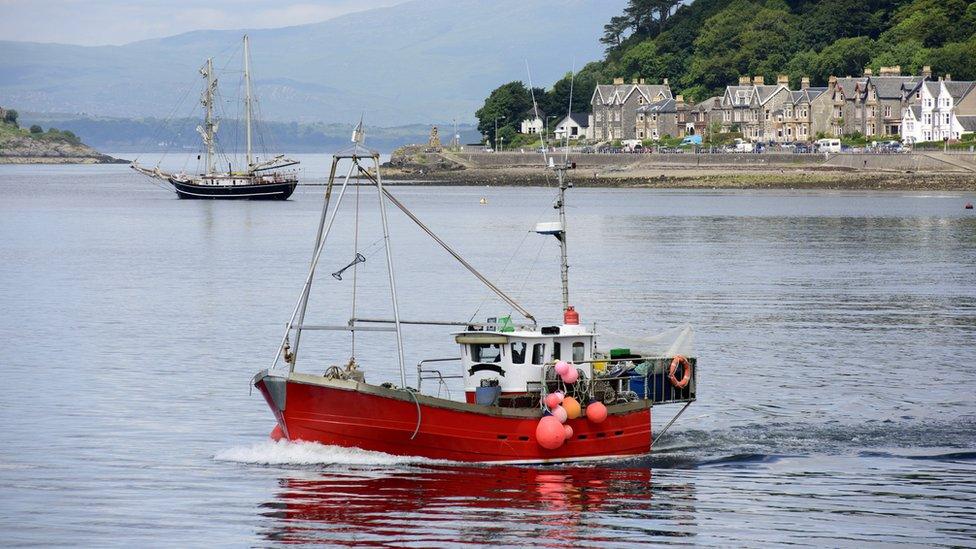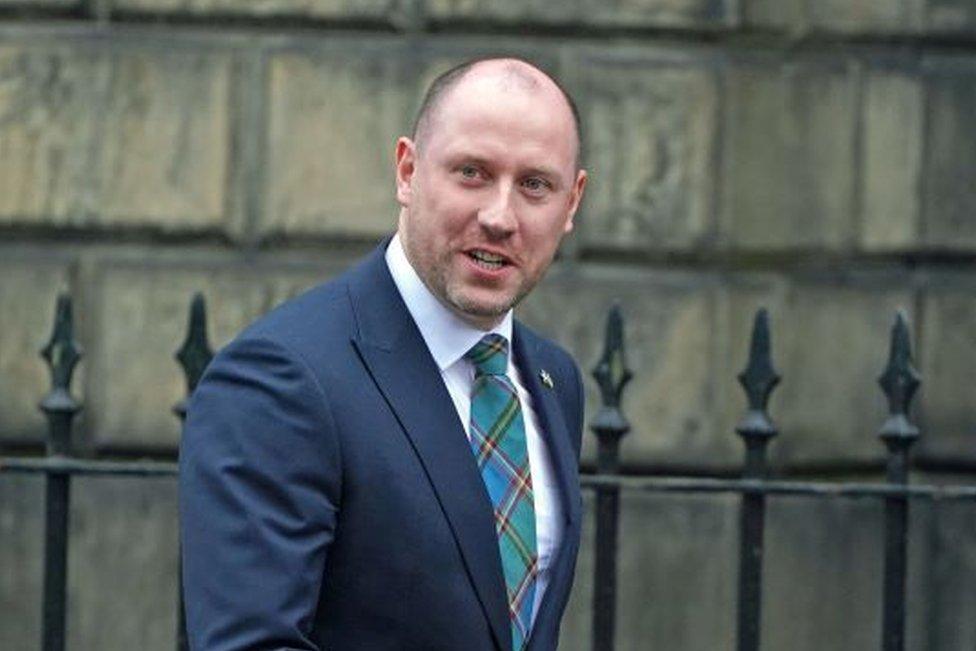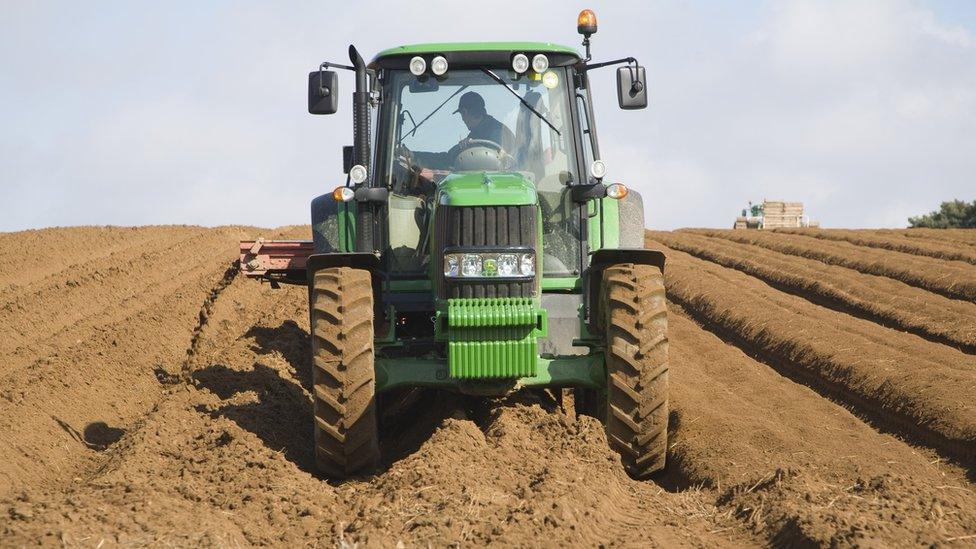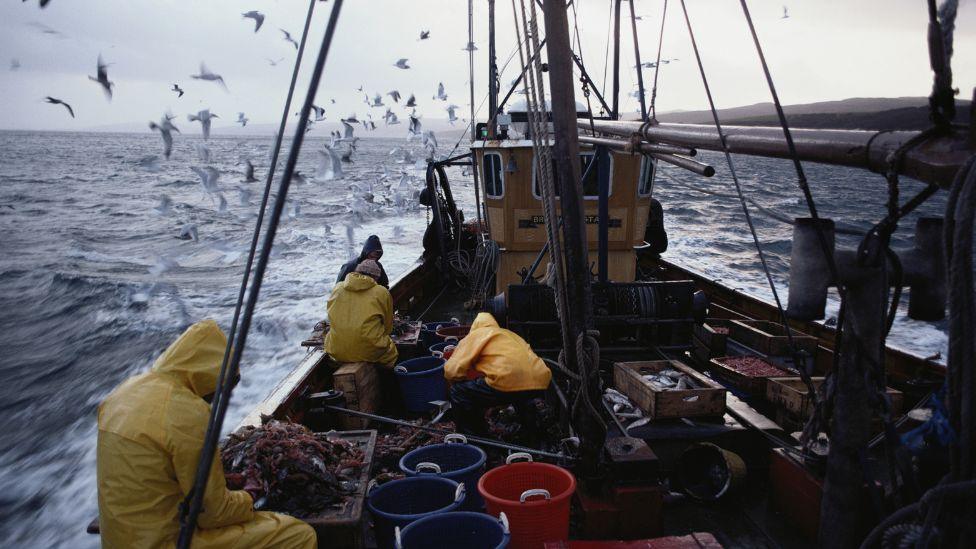A 'different way' of taking care of business
- Published

A report on government relations with business was published just as a controversial marine protection policy was scrapped
A 'different way' of the Scottish government working with business and a 'new deal' between them have been forged in the heat of some unusually robust and open criticisms of problems that have been allowed to build up.
After the ditching of high profile policies, Scottish ministers have agreed to work with business on the practicalities and cost of reforms at a much earlier stage of planning them.
The 'new deal' process has created a forum to press for radical reform of business rates, and to voice scepticism about putting wellbeing into the operations of private firms.
Business is back in St Andrew's House, and it has wrung some commitments out of Scottish government ministers, in a bid to ensure that it can't be so easily excluded again.
A review of relations with Scotland's business communities was published in the pre-Holyrood-recess wash-up of announcements. It was at the same time as Mairi McAllan, the cabinet secretary responsible for the proposals on protecting Scotland's marine environment, was filing those plans in the dustbin of ignominy.
The highly controversial Highly Protected Marine Areas (HPMAs) plan was the latest in an unhappy list of policies which have failed to survive contact with a) business b) reality or c) both.
You'll recall the deposit return scheme (DRS). Further back in the early days of Humza Yousaf's premiership, he saw off the plans to ban advertising of alcohol.
The National Care Service met opposition on many fronts, and the private business bit of care provision was only one to raise its concerns. That's being paused and re-thought as well.
Mr Yousaf acknowledged that the leadership contest had made it clear that all was far from well in relations with business. Some of those whose job is to engage from the private sector will privately admit that the contest was an excellent opportunity to get a hearing.
So an early commitment was a New Deal with Business, to be shaped by a new cabinet secretary, Neil Gray, arriving in the cabinet room with more vigour and enthusiasm than some of his more experienced and battle-scarred colleagues.
The outcome of that engagement includes those commitments to engage with business before future policies are put out to consultation, and to carry out more robust assessments of the impact of proposed changes.
A task force on better business regulation, which was parked at the start of Covid, is to be re-started, with serial troubleshooter Prof Russel Griggs back in the chair.
Practical application, unintended consequences and simple workability are to be factors that civil servants and ministers will have to consider before their plans are put to the public.
Credibility and trust
The 40-page document, external published by the Scottish government on Thursday does not sugar-coat the business perceptions.
"There is a lack of openness and transparency in the government policy development process that has led to a lack of credibility and trust in the government on the part of business," it says.
It raises issues with a lack of data use in policy-making and says businesses are not involved at an early stage in the policy cycle.
These views don't come as a surprise, but it is unusual to be reading them published in a Scottish government document.
The business of lobbying government is usually couched in more diplomatic terms, so this suggests a high scunner factor and "what have we got to lose?"
Business representatives round the St Andrew's House table left little doubt about the limitations they perceive in officialdom: "A better process for engagement with business will give policymakers access to the skills of those in business, who by definition are creative, innovative and practical". Unlike, for instance... ?

The new deal for business is to be shaped by Cabinet Secretary Neil Gray
And that was just one of the sub-groups' reports back, on partnership working. The one on regulation had a much bigger agenda.
That's where the problems have arisen over recent policies on alcohol advertising, bottle deposits and marine protection. And that's where the most progress has been made in wringing those promises out of ministers about advance notice on future policy proposals.
One issue that clearly rankled in the bottle deposit scheme is that business already recycles almost all its glass, and there were suggestions the scheme being proposed by the Scottish government could reduce that level of recycling.
So it is pointed out that officials might like to find out what's already being done by business to achieve an objective, before telling business it ought to do something else that might be less effective.
There was a sub-group on business rates, which also really rankles, and which made rather less headway towards the major reform that some business participants wish to see. They have at least kept that on the table for future discussion.
This "new deal" sub-group highlighted the lower levels of business rates relief for some sectors in Scotland than in England, including retail and hospitality.
The Scottish Chambers of Commerce suggested there should be a business grant from the Scottish government to pay the cost of applying its policy.
Wishing well
The report from a sub-group on the wellbeing economy carried heavy scepticism about the concept.
The group appeared to spend its time asking what a wellbeing economy is, what it would look like, and how it can be measured. It concluded that the initial objective of policy should be define what it is ministers are going on about.
Under the heading "So what?", they then look to the Scottish government to explain why they should care, what their business has to do with it, and how they're supposed to respond.
"The overarching lesson we learned is to use the right language to communicate with businesses," says the report. "Only a minority would understand what is meant by a 'wellbeing economy' and the language used around it can turn business owners off where it is perceived as being governmental and academic."
The sceptical voice of business is even louder and more indignant when they get to the question of "whose wellbeing?"
"One of the most significant ways in which many businesses support Scotland's transition to a wellbeing economy is through implementing fair and inclusive work," it says.
It adds certain aspects of the wellbeing economy are orientated towards employees, but the wellbeing of business owners are as much a part of it.
It mentions the hundreds of thousands of self-employed workers in Scotland, many of whom are business owners who are "very low paid and under significant pressures" - such as farming, an industry with one of the highest suicide rates.

So far, the process of getting to that New Deal for Business seems to have been an opportunity to vent some steam, as well as setting out short, medium and longer term objectives. With some policies going back to the drawing board, and ministers committed to listen, the next stage may be a bit less fractious.
But the next stage will involve even more of the difficult decisions around getting the economy to net zero carbon emissions. That includes big challenges and costs to businesses, and not only in Scotland.
Then the first minister is committed to using the tax system to load more on to those most able to pay it, as part of a redistribution agenda. That conversation moves on to the Scottish government's new advisory board on those tax reforms. Its membership of academics and other tax experts was named as the New Deal document was published.
Shona Robison, the finance secretary, cannot be accused of choosing people who will make her life easy.
The proposals for change will be a fascinating test of how well that new deal is working.
- Published29 June 2023

- Published29 June 2023

- Published8 March 2023

